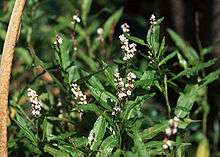Persicaria hydropiperoides
| Persicaria hydropiperoides | |
|---|---|
 | |
| Scientific classification | |
| Kingdom: | Plantae |
| (unranked): | Angiosperms |
| (unranked): | Eudicots |
| (unranked): | Core eudicots |
| Order: | Caryophyllales |
| Family: | Polygonaceae |
| Genus: | Polygonum |
| Species: | P. hydropiperoides |
| Binomial name | |
| Persicaria hydropiperoides (Michx.) Small | |
| Synonyms[1][2] | |
| |
Persicaria hydropiperoides is a New World species of flowering plant in the buckwheat family known by the common names swamp smartweed and false waterpepper. It is widespread across much of North America and South America.[3][4][5][6][7] It grows in moist and wet habitats, and is sometimes semi-aquatic.
Persicaria hydropiperoides is quite variable and is sometimes divided into several varieties, some of which may be better treated as species in their own right.[2]
In general, Persicaria hydropiperoides is a rhizomatous perennial herb growing upright or erect and approaching a maximum height of one meter (40 inches). Roots may emerge from nodes on the lower stem. The bristly lance-shaped leaves are around 10 centimeters (4 inches) long. The leaves have sheathing stipules known as ochrea. The spikelike inflorescence produces many pinkish flowers each about 3 millimeters wide.[2]
References
- ↑ The Plant List, Persicaria hydropiperoides (Michx.) Small
- 1 2 3 Flora of North America, (Michaux) Small, 1903. Swamp smartweed, renouée faux-poivre-d'eau
- ↑ Biota of North America Program 2014 county distribution map
- ↑ Jørgensen, P. M., M. H. Nee & S. G. Beck. (eds.) 2014. Catálogo de las plantas vasculares de Bolivia, Monographs in systematic botany from the Missouri Botanical Garden 127(1–2): i–viii, 1–1744
- ↑ Marticorena, C. & M. Quezada. 1985. Catálogo de la Flora Vascular de Chile. Gayana, Botánica 42: 1–157.
- ↑ Porter, D. M. 1983. Vascular plants of the Galapagos: Origins and dispersal. 33–54. In M. B. R. I. Bowman & A. E. Leviton Patterns of Evolution in Galapagos Organisms. Pacific Division, AAAS, San Francisco
- ↑ Cowan, C. P. 1983. Flora de Tabasco. Listados Florísticos de México 1: 1–123.
External links
- Jepson Manual Treatment
- United States Department of Agriculture Plants Profile
- Missouri Plants Photo Profile
- Calphotos Photo gallery, University of California
- photo of herbarium specimen at Missouri Botanical Garden, collected in Peru in 2012